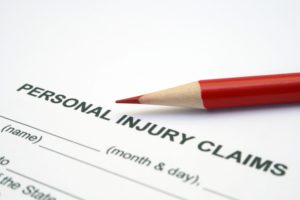Suffering a severe injury is bad enough, but suffering a serious injury and then having your personal injury claim rejected? That adds insult to injury – no pun intended. You may think this type of event is rare, but it happens often for a variety of reasons. Insurance companies regularly deny personal injury claims – despite plenty of evidence that the victim was injured due to someone else’s negligence.
If you or a loved one suffered an injury and had your personal injury claim rejected, the Edmonton personal injury lawyers at Chadi & Company can help. We understand the toll that the emotional, physical, and financial stress of a denied claim can take on you and your family, and we do everything we can to resolve your claim as efficiently – and effectively – as possible. Read on to learn some common reasons why personal injury claims are rejected, what your options are, and the ideal conditions for appealing a personal injury claim denial.

Why was my personal injury claim rejected?
Personal injury claims are rejected for a wide variety of reasons. Insurance companies that are all too happy to collect your premiums are not nearly as eager to pay out on claims. This includes valid personal injury claims. Instead, these companies look for loopholes – basically, any reason they can legally reject your claim. These reasons range from fairly straightforward, administrative issues to more complex matters, such as:
- Missed Deadlines. This is a common reason personal injury claims are rejected. If you or your lawyer miss the deadline or time limit for filing a claim, it can be dismissed.
- Missed Payments. Your personal injury claim may be rejected if you failed to make all of your premium payments in a timely manner.
- Clerical Errors. Typos happen to everyone at some point, but they are typically just a nuisance. Not so when a personal injury claim is involved. Even simple errors – such as a misspelled name, an incorrect date, or any other detail that is incorrect on your paperwork – can be grounds for rejecting your personal injury claim.
- Policy Exclusion. Specific injuries may be excluded under your policy. It may not be immediately apparent that you are not covered in these instances, as insurers often put this information in the fine print. It is possible that you might learn of these exclusions only after your claim has been rejected. It is also possible that these exclusions may not be legal.
- Pre-existing Conditions. Certain pre-existing conditions may make you ineligible under your policy. These include previously- unaware conditions and ones you did not have in your claim.
- How You Were Injured. If you suffered an injury because of an activity that is excluded from your insurance policy, such as drinking or illegal drug use, your claim may be rejected.
- Incomplete Medical Information. If you fail to submit all required information, including medical evidence related to your claim, your insurer may state that the injury does not exist and thus reject your claim.
- Failure to Avoid or Mitigate Injury. Your personal injury claim may be denied if it is determined that your actions contributed to the injury or exacerbated it. In other words, if you could have avoided the injury altogether or if you could have avoided making it worse by seeking treatment immediately and following all recommended medical advice, your claim may be denied.
- Any Evidence that Your Injury is Not Real. Your insurance company may not be able to reject your claim based on a missed deadline, policy exclusion, or missing or inaccurate information, but what if they obtain proof that contradicts your claim? Any evidence that demonstrates that your injury is not as severe as you claim may be grounds for rejection. This includes social media posts or videos or the results of actual surveillance.
With so many possible reasons a personal injury claim may be rejected, it is vital that you consult a lawyer with experience handling these claims. A knowledgeable personal injury lawyer can thoroughly review your case and your policy to determine the best grounds for appeal.
What options do I have if my personal injury claim was rejected?
If your personal injury claim was rejected, you have a few options:
- Appeal the decision
- File a lawsuit against the insurance company
- Negotiate a settlement with the insurance company
These are all valid options, but the best one depends on the specifics of your situation. If your personal injury claim is rejected, the first thing you should do is review the rejection notice and your insurance policy. If you believe that the rejection was unwarranted, you should contact your insurance company immediately and ask them to explain why your claim was denied. If the insurance company is unable to provide a reasonable explanation – or if you do not trust that what they are saying is accurate or that they are acting in good faith – you should contact a personal injury lawyer. This is particularly important if you or a loved one suffered a severe injury and the insurance company is unable to provide a valid reason for rejecting your claim. A skilled personal injury lawyer can review your claim, your policy, and the insurance company’s rejection to determine if you have grounds for an appeal or case against your insurer.
If you are considering legal action, it may also make sense to sue the insurance broker who sold you your policy and, if you were injured on the job, your employer.
What should I consider before making an appeal?
Appealing your insurance company’s rejection of your personal injury claim may be the best option for you, but before making that decision, consider the following:
- Appeals Process. Appealing a personal injury claim rejection can be a lengthy process that may drag out over months or years. This could cause financial hardship if you are unable to work and support yourself during this time.
- You May Lose. The evidence you are required to submit in support of your appeal may actually end up working against your claim and instead support the insurance company’s decision.
- Timing. The extensive time it takes to complete the appeals process could cause you to miss the deadline to file a lawsuit against the insurance company. This will leave you with no legal recourse if you lose your appeal.
Seek legal advice from a skilled personal injury lawyer.
A serious injury can lead to severe expenses and leave you unable to work or take care of yourself or your family in the ways you did before you were injured. The idea that the insurance policy you have paid into in good faith would be honoured is not unreasonable. If your personal injury claim is rejected for reasons that are invalid or that the insurance company cannot explain, there may be too much at stake for you to simply accept their decision. At that point, it is time to speak with a personal injury lawyer.
At Chadi & Company, our Edmonton personal injury lawyers conduct a thorough review of your personal injury claim and your policy to determine why your claim was rejected and if there was any validity to that decision. We then identify the best grounds for an appeal and work hard to ensure it is effective. We offer a confidential consultation and stand ready to fight on your behalf. Contact us today by completing our online form or call us at (780) 429-2300.






